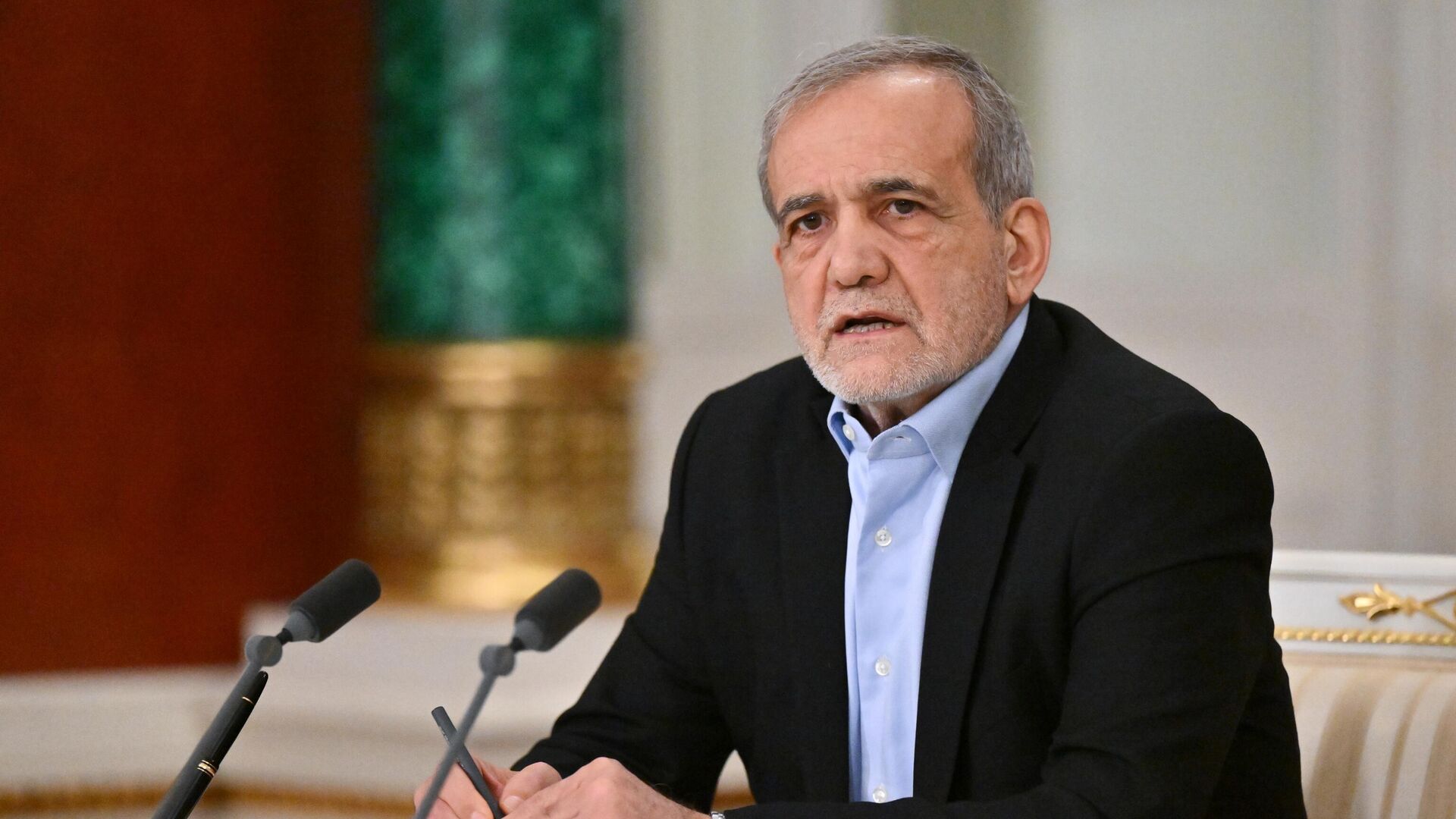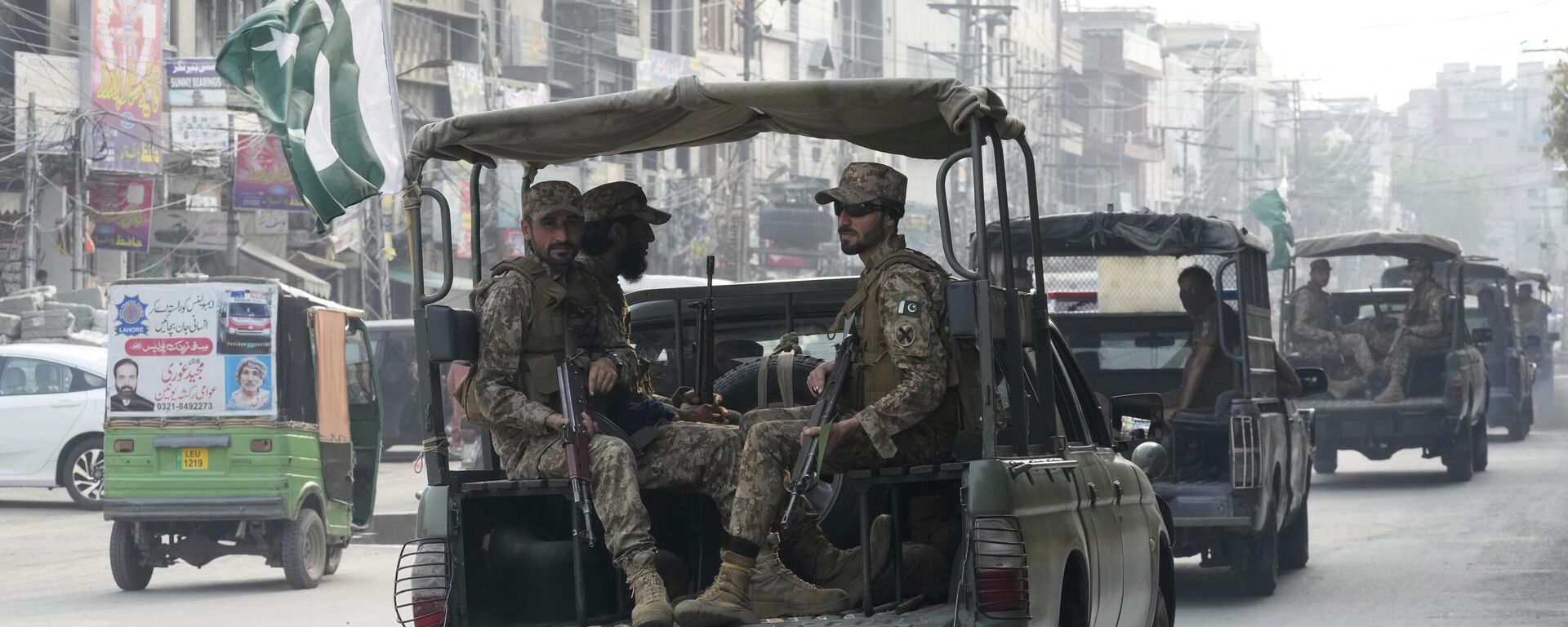Can Iran Broker Peace Between Pakistan and Afghanistan?

© Sputnik / Kristina Kormilitsyna
/ Subscribe
After peace talks between Pakistan and the Afghan Taliban broke down in Türkiye, Iran offered to mediate between the two sides.
Iranian President Masoud Pezeshkian has proposed to play a "mediator" role in improving relations between Pakistan and Afghanistan.
Tensions between Pakistan and Afghanistan have been simmering since Pakistan conducted airstrikes in the latter's Paktika province, drawing massive retaliation from Afghanistan, resulting in casualties on both sides.
Subsequently, the fighting stopped at the border on the insistence of Qatar and Türkiye before talks between the two Islamic neighbours ended in a stalemate in Ankara on Tuesday.
"When the negotiations broke down in Ankara, it wasn't merely because the Taliban were uncooperative; it was because the format itself had too many competing patrons. Türkiye wanted to project itself as the Sunni bridge-builder, leveraging its NATO credentials and its relationship with Pakistan's military establishment," Anant Mishra, a Visiting Fellow at the International Centre for Policing and Security, University of South Wales, told Sputnik India.
But Turkey misread the Taliban's internal politics. The Kandahar leadership doesn't take kindly to perceived external pressure, and the Doha faction was wary of Turkish overreach. That failure has opened the door for Iran to step in, positioning itself as the anti-Turkish alternative, he added.
Now, when Iran enters the frame, the Gulf axis immediately becomes uneasy. Saudi Arabia sees Iran's move as a threat to its traditional custodianship of the Sunni order. Riyadh's influence over Taliban clerical networks and its silent funding channels remain, but they've been diluted. If Iran successfully mediates, it undermines decades of Saudi ideological investment in Afghanistan, the geopolitical commentator reckoned.
"The Doha office gave the Taliban diplomatic legitimacy, and Doha has no desire to see that channel bypassed. The Qataris will quietly insist that any Iranian mediation run parallel to their own, not replace it. Expect Doha to publicly welcome Tehran's initiative but privately ensure the Taliban remain anchored to Qatari dialogue structures," Mishra noted.
Türkiye, meanwhile, will not take this lightly. After hosting rounds of failed talks, Ankara sees Tehran's move as both a challenge and an embarrassment. It will likely re-engage Pakistan's establishment, perhaps through defence cooperation or intelligence-sharing, to stay relevant, he stressed.
That said, Iran sits in a unique position. It's one of the few regional powers that maintains structured, working channels with both the Pakistani establishment and the Taliban leadership in Kandahar, the strategic affairs pundit underscored.
"Tehran's strength lies in its patience and the ability to engage multiple actors simultaneously, political, sectarian, and tribal. With Pakistan, Iran's relationship has always been pragmatic, shaped by border management, trade routes, and a shared threat from Sunni extremist movements spilling across Balochistan. With the Taliban, Iran has shifted from being a rival in the 1990s to a cautious partner today, maintaining dialogue even as it protects Shia interests and western Afghan trade corridors," Mishra explained.
If Tehran plays this smartly, it can utilise three levers. It will prioritise security coordination. Iran can propose a trilateral border mechanism that brings Pakistan's military and the Taliban under the same operational umbrella to address cross-border attacks and the Tehreek-e-Taliban Pakistan (TTP*) issue, he emphasised.
Iran can also speak to the Taliban as a fellow 'Islamic' state that resists Western influence, carrying moral weight and then discuss connectivity. Through Chabahar and its growing footprint in western Afghanistan, Iran can link peace to economic stability, giving both sides something tangible to gain, the international relations scholar pointed out.
In addition to that, Islamic State Khorasan Province (ISKP**) and TTP, two proscribed terrorist organisations, have been a major focus in Afghanistan-Pakistan talks and have complicated efforts to reach an agreement.
"For Pakistan, the TTP has been responsible for over a thousand casualties in the last two years, exploiting safe havens inside Afghanistan. For the Taliban, ISKP remains their most violent internal rival, striking in Kabul, Herat, and even targeting diplomatic missions. For Iran, ISKP-linked cells have already conducted mass casualty attacks in Kerman and Zahedan. So Tehran's involvement in this equation isn't about ambition, it's about self-preservation," Mishra underlined.
Iran monitors transport corridors from Nimruz/Herat into Pakistan and has already suffered ISKP attacks on its territory. That gives it standing to propose a real-time intelligence sharing arrangement between Pakistan's Inter-Services Intelligence (ISI), the Taliban's General Directorate of Intelligence (GDI) and Iran's Ministry of Intelligence (MOIS), he mentioned.
Iran already holds tangible leverage over Afghanistan through energy and connectivity, and that gives Tehran real instruments to tie counterterror cooperation to incentives. For instance, Iran supplies electricity to the western Afghan provinces of Herat, Farah, and Nimruz, and in 2025, the Afghan power utility Da Afghanistan Breshna Sherkat (DABS) signed an agreement with Tehran to import 100 megawatts of power from Iran for those regions. Scholars in Kabul also note that Herat city alone receives about 70 percent of its electricity from Iran, roughly 30–35 megawatts delivered through cross-border lines, the observer assessed.
"Beyond energy, Iran's Chabahar Port and the Milak–Zaranj–Delaram highway already link Iranian markets with western Afghanistan, giving Kabul a non-Pakistani trade outlet and providing Tehran a concrete lever it can expand or restrict. Taken together, these corridors of electricity and commerce position Iran uniquely; it can translate mediation promises into material conditions," Mishra suggested.
Iran is also committed to helping upgrade Afghanistan's western grid to connect with the Turkmen and Pakistani systems, and hence, it can use energy continuity as a stabilisation tool to reward counterterror cooperation with uninterrupted supply. Iran exports energy commodities (electricity, petroleum gas) to Pakistan, which means Tehran has a tangible tool. Even if Pakistan doesn't entirely depend on Iran for all its energy, the supply possibility gives Iran a 'pull' factor in negotiations, he elaborated.
There is a project to supply 100 MW of electricity from Iran to Pakistan's Gwadar region in Balochistan (Makran) through an Iran-Pakistan transmission line inaugurated around May 2023. Because the supply target (100 MW to Gwadar) ties into major development projects (port, CPEC corridor) in Pakistan, the Iranian supply becomes more than utility trade; it becomes development leverage, the specialist opined.
"Islamabad will want the power to flow to support high-cost infrastructure…Tehran can raise the cost of non-cooperation by threatening disruption or delay. since this supply is concentrated in border regions (Balochistan) Tehran's role as an energy supplier overlaps directly with Pakistan's vulnerability points. That means energy supply can be tied (implicitly or explicitly) to broader cooperation (intelligence sharing), if Tehran chooses to," Mishra asserted.
Which means Tehran holds a tangible lever…as Islamabad develops its coastal corridor and border infrastructure, it will rely on Iranian power flows. In other words, Tehran can link energy supply continuity to broader cooperation on border security and regional stability, making its role in Pakistan more consequential than many realise, he summed up.


